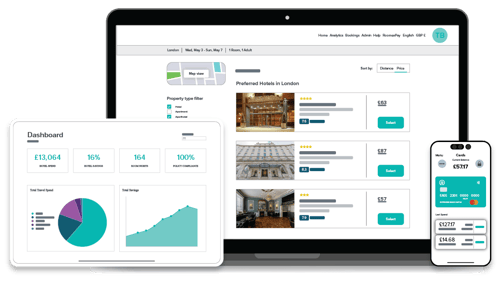As we’ve seen over the past 12 months, sustainability has crept up the news agenda crossing over into the mainstream. As a pressing issue, there’s no escaping it as a priority in your organization.
As the world starts to return to ‘pre-pandemic normality’, so are norms such as business travel. However, in light of the past two years, and recent events such as COP21, we must come together to look at how we move forward with a new emphasis on minimizing our global footprint.
With time to reflect on our personal and professional habits, co-workers will undoubtedly return to the office with a renewed interest in their part to play too. In a recent industry survey, over half of all European companies said they include sustainability initiatives in their company’s travel policy – a figure that’s only set to grow.
So where does this leave your business? If you haven’t already reviewed your existing travel policy, or if you’re in the process of creating one, it’s time to put your sustainability hat on.
Here’s how…
Be clear on your objectives
First and foremost, it’s important to understand what your corporate sustainability program stands for and what your objectives are. Is it to rebalance your organization's carbon footprint, to improve the way you conduct business travel, or perhaps to lead the way in your sector?
Once you understand your core objectives, everything else will fall into place. These values should be shared with colleagues and should be easy to remember, so they can be widely adopted and implemented in the long-term.
Minimizing and prioritizing travel
When creating a travel program, it’s important to look at how you can operate in the most efficient way. A helpful tool for evaluating this is the ‘three Rs’, as follows:
- Reduce: How can you lower your carbon footprint on a business trip? For instance, carpool options, or perhaps limitations on the number of times you fly annually.
- Review: Business travel is an essential and important part of corporate life, and as we’ve seen, there’s no compensation for face-to-face meetings. However, not all business trips are essential. Is there a process in place to review what trips should be prioritized and the criteria in place so decisions are made without bias?
- Replenish: Look at how you can compensate for emissions produced. There’s a growing number of ways you can offset your carbon footprint when traveling for work or pleasure. For instance, Roomex plants a tree for every 100 hotel rooms booked through its platform. In partnership with OneTreePlanted, it’s a thoughtful way to balance out the necessity of work travel.
Keeping it consistent
Sustainability shouldn’t be seen as a box-ticking exercise, it must be a considered and authentic part of your overarching business strategy. As such, your corporate travel program must dovetail into your company’s key sustainability objectives. How can your business support the communities it serves and make a difference in an authentic way? This should be at the very core of what you’re trying to achieve.
Returnable benefits
You can’t dispute the data, which is why it’s so important to be able to demonstrate a return on investment (ROI) to key decision makers. One of the many benefits of a considered sustainability travel program is that it can reduce unnecessary travel and associated costs, as well as helping to meet targets such as zero-waste. There’s also the benefit of brand perception to customers and clients, as a business with green credentials.
Engage colleagues
Since your employees are often at the forefront of business travel, why not ask them for their views and feedback? Not only can this help generate great ideas to take forward, but it will help them understand why a sustainability program is important, and encourage buy-in.
Collecting data
Collecting CO2 data from suppliers, clients and tools is one way you can manage and therefore mitigate (or offset) your carbon footprint. It might also force you to look at other, perhaps more efficient ways of operating. For instance, Roomex has seen an increase in queries around its ability to simplify the travel process, and help businesses stay on top of work travel movements.
Summary
The global pandemic has given us an opportunity to pause and evaluate the way we carry out business. As we return to business travel, the time is now to review how we can better align values with strategy and make a positive change for the future of our planet in a positive way.

June 16, 2022

